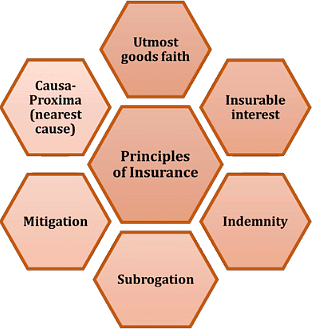Seven Principles of Insurance | IBPS PO Prelims & Mains Preparation - Bank Exams PDF Download
Introduction
Insurance concept was started to distribute risk among group of people. Co-operation is the basic principle behind every insurance contract.
1. Principal of Utmost Good Faith
- Both parties, insurer and insured should enter into contract in good faith.
- Insured should provide all the information that impacts the subject matter
- Insurer should provide all the details regarding insurance contract
For example - John took a health insurance policy. At the time of taking policy, he was a smoker and he didn't disclose this fact. He got cancer. Insurance company won't pay anything as John didn't reveal the important facts.
2. Principle of Insurable Interest
- Insured must have the insurable interest on the subject matter
- In case of life insurance spouse and dependents have insurable interest in the life of a person. Corporations also have insurable interests in the life of it's employees
- In case of life or marine insurance, insured must be the owner both at the time of entering of entering into the insurance contract and at the time of accident.
3. Principle of Indemnity
- Insured can't make any profit from the insurance contract. Insurance contract is meant for coverage of losses only
- Indemnity means a guarantee to put the insured in the position as he was before accident
- This principle doesn't apply to life insurance contracts
4. Principle of Contribution
- In case the insured took more than one insurance policy for same subject matter, he/she can't make profit by making claim for same loss more than once
For example - Raj has a property worth Rs.5,00,000. He took insurance from Company A worth Rs.3,00,000 and from Company B - Rs.1,00,000.
In case of accident, he incurred a loss of Rs.3,00,000 to the property. Raj can claim Rs. Rs.3,00,000 from A but after that he can't make profit by making a claim from Company B. Now Company A can make a claim from Company B to for proportional loss claim value.
5. Principle of Subrogation
- After the insured gets the claim money, the insurer steps into the shoes of insured. After making the payment insurance claim, the insurer becomes the owner of subject matter.
For example :- Ram took a insurance policy for his Car. In an accident his car totally damaged. Insurer paid the full policy value to insured. Now Ram can't sell the scrap remained after the scrap.
6. Principle of Loss Minimisation
- This principle states that the insured must take all the necessary steps to minimize the losses to inured assets.
For example - Ram took insurance policy for his house. In an cylinder blast, his house burnt. He should have called nearest fire station so that the loss could be minimised.
7. Principle of Causa Proxima
- Word "Cause Proxima" means "Nearest Cause"
- An accident may be caused by more than one cause. In case property insured for only one cause. In such case nearest cause of the accident is found out.
- Insurer pays the claim money only if the nearest cause is insured.
|
670 videos|1101 docs|322 tests
|
















